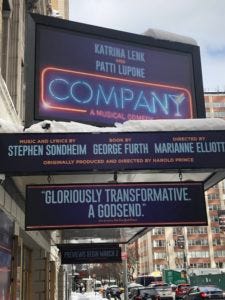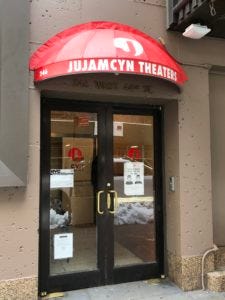INSURANCE KEEPS 'COMPANY,' 'COME FROM AWAY' ALIVE AS JUJAMCYN FIGHTS CHUBB SNUB
EXCLUSIVE: No one put more money into the highly anticipated Broadway revival of Company than the insurance giant Chubb.
The Ladies Who Lunch LLC, which transferred the Stephen Sondheim and George Furth musical from the West End only to suspend it during previews because of Covid-19, received $8.85 million from Chubb, according to an email that lead producer Chris Harper sent to investors.
[optin-monster-shortcode id="ufmzva3zcgozitcwjwim" followrules=true]Meanwhile, Broadway's third-largest landlord, Jujamcyn Theaters, is battling Chubb in court for a bigger piece of the pandemic payout.

Bernard B. Jacobs Theatre/Philip Boroff
The Company money will enable the production to eventually open with a large cash cushion, or reserve, Harper wrote in September. The windfall, he wrote in another investor email, is the result of a "very robust policy" that "covers actual expenses incurred during the shutdown as well as lost profits." Based on a recoupment chart, the $8,849,100 is equivalent to 80 percent of potential sales at the Bernard B. Jacobs Theatre over nine weeks.
The cash lasts much longer: while waiting out the pandemic, the $13 million show spends a fraction of its normal weekly expenses, with its cast, crew and musicians off the payroll.
When Covid-19 forced Broadway into an endless intermission nearly a year ago, some producers were skeptical that insurers would step up. But many productions benefited from contracts that offered broad protection. And the staples of Broadway accounting -- past ticket sales, advance ticket sales and weekly expenses -- helped productions document losses from the shutdown. "We've been lucky to have policies written more irrefutably than other industries," said Hunter Arnold, a lead producer of Hadestown and a busy co-producer.
Roundabout Theatre Co., the nonprofit company that operates three Broadway houses and suspended a revival of Jeanine Tesori and Tony Kushner's Caroline, or Change, received $5 million in what's known as performance disruption insurance. Thanks to the proceeds, plus gains in its $71.5 million investment portfolio (as of August), a $5.4 million federal Paycheck Protection Program loan and grants and donations, the Roundabout's overall net assets declined by just 4 percent, according to its 2019-20 audited financial statement.
During the financial crisis of 2008-09, its net assets declined by 7 percent.
Lincoln Center Theater, with one Broadway house, weathered a comparable not-bad-under-the-circumstances 4 percent drop in net assets last season, to $161 million. It received $3.3 million from insurance and $3.7 million from a PPP loan, according to the nonprofit organization's financial statement. Donors redirected grants originally intended for productions to general operating support. And like other companies, LCT laid off staff and cut the pay of employees who remained.
The Broadway musicals Dear Evan Hansen, Hadestown, Girl from the North Country and Come From Away were among those that got sizable insurance proceeds. Carl Pasbjerg, the general manager of Come From Away, extolled Chubb and its performance disruption insurance in a promotional video. "If we didn't have this coverage, it's very dicey that we'd be able to even survive as a business, or as an industry," he said in the video, posted on Chubb's website. (Pasbjerg declined an interview request, as did Harper.)
Although the payouts ultimately benefited Broadway landlords, which waited to collect rent until their tenants received insurance proceeds, they're not all singing insurers' praises. Jujamcyn has been in federal court for six months battling two Chubb subsidiaries to compel an increase in Jujamcyn's relatively meager payout of $250,000.

Jujamcyn, which according to property records has a $200 million mortgage, was required by its primary policy to demonstrate that "direct physical loss or damage" was behind its loss in income. Jujamcyn argued in court papers that the presence of the virus that causes Covid in its airways was tantamount to direct damage. Chubb countered that Jujamcyn needed to suffer tangible damage -- a "physical alteration" -- to qualify for a payout.
Chubb did offer $250,000 in performance disruption insurance proceeds to Jujamcyn in response to a second policy. Jujamcyn said that it's owed $250,000 for each of its five theaters.
A Chubb spokesman didn't reply to emails for comment. A spokesman for Jujamcyn, which is led by Jordan Roth, declined to comment.
Making matters worse for Broadway: when the pandemic erupted early in 2020, Chubb and other insurers stopped offering new coverage for the performing arts for losses caused by viruses and communicable diseases.
"It's a reality of life that producers and their investors will have to move forward with that [pandemic] exclusion," said Bob Middleton, director of the Arts Insurance Program of Maury Donnelly & Parr. "No one knows when the next pandemic will hit."
Middleton said insurers are acting like bears that got burned. "They're not going to get near the fire anytime soon."
Jujamcyn noted in its August complaint that reopening theaters will likely require structural alterations, including adding protective barriers and partitions and new or redesigned air flow and filtration systems and seating. That could be costly, as will advertising to reintroduce Broadway to the world.
After four years in which theater wasn't part of the national agenda, the tide has turned in Washington. Under the Save Our Stages legislation, which was signed into law at year-end, the U.S. Small Business Administration will provide grants of up to $10 million each, for music and theater venues and producers and nonprofit theater organizations. Last month, New York Senator Chuck Schumer, the newly installed majority leader, made a surprise appearance on a webinar with members of the Broadway League. He pledged to work to tailor the rules of the grants to accommodate theater.
There are questions about how far the $15 billion legislation will go, given that museums and movie theaters are also eligible to apply for money. But having a Senate majority leader who lives in Brooklyn and champions Broadway is a boon for producers and investors. Especially with pandemic insurance out of the picture for the foreseeable future.


